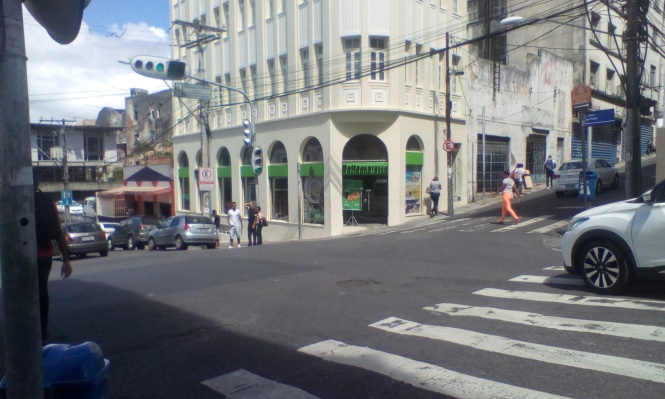I traveled to Salvador da Bahia, Brazil last year to work with Afro-Brazilian women who preserve African spiritual traditions. There, I recorded approximately 23 hours of audio with Candomblé priestess Nancy de Souza e Silva AKA Dona Cici, an internationally renowned wise elder (ebomi) who studied intensively with the famed French photographer/ethnologist Pierre Verger during the last few decades of his life. Researchers have flown her to France, Benin and the United States to share her knowledge. In addition to working with academics, she intentionally devotes her time to teaching under-resourced, predominantly Black children in a low-income neighborhood of Salvador da Bahia because she wants to transmit her knowledge to the younger generations of Afro-Brazilians.
My goal is to transcribe and translate my interviews with her to create a text in both English and Portuguese that she can sell to generate an additional income stream for her and the children she teaches. This is important because she does not speak English and many devotees of Afro-diasporic religions in the US want to learn from her. I am also reaching out to departments at my school and am approaching Brazilian universities for support in launching the book. The Association for the Protection of Devalued People, an organization founded by Black men in 1832 to provide care for enslaved people and purchase their freedom, has offered to host the book launch because Dona Cici is so respected. When I brought her there, they inducted her into the Association immediately.
I did not complete my project in the time I planned. I am so grateful for the opportunity to get first-hand experience doing independent research, and it taught me that I need to budget more time and money and not assume that everything will go as I predicted. I am, however, completely committed to following this through to completion. I have already arrived in Brazil and am blessed to have a place to stay where I will devote my days to transcription, translation and printing the books. Towards the end of the summer, I plan to return to Salvador to launch Dona Cici’s book.

Pictured above is a building in Salvador da Bahia where slaveholders imprisoned enslaved African people. Today it is a storefront like any other in the Pelourinho neighborhood, where Afro-Brazilian culture is commercialized for tourist consumption and people of African descent still face institutional racism. Dona Cici’s memory matters! She tells a different story than the narrative for tourists: one that honors Afro-Brazilian ancestors and their living descendants.
Afro-Brazilian women like Dona Cici and her ancestors have defied white supremacist oppression and preserved sacred knowledge for hundreds of years. She has devoted decades to studying her heritage and sharing it with children from under-resourced communities. My goal is to organize and publish a small portion of her wisdom –
only information that is permitted to be shared with non-initiates – so that:
1) She can have an additional income stream for her work with youth in Salvador da Bahia
2) Devotees of Afro-diasporic religions who cannot travel to meet her in person can still learn from her
3) People who don’t understand Portuguese can learn from her
I know that my positionality as a college-educated US citizen descended from settler colonists makes it easier for me to cross borders and oceans than it is for many people of indigenous and African descent. My intention is to use my social capital to connect the wisdom of Dona Cici and her lineage with spiritual seekers who could benefit from her knowledge through a fair exchange in which she is justly compensated (receiving all profits from the book).
Background information:
I have been following a spiritual path of Ifá practice since 2013, guided by Babalawo Awo Fasegun (initiated in the Adesanya lineage of Ode Remo) and Iyanifa Fayomi Osundoyin Egbeyemi in the community of practice Ile Orunmila Afedefeyo.
Some important points:
– I will not be publishing any secret or sacred information. This text will only contain knowledge that non-initiates are pemitted to access. Protecting spiritual information is extremely important. This text is largely about Dona Cici’s life, her perspectives on different topics, and guidance she offers to live well.
– The proceeds of her books will go to her.
– I paid her every time that I recorded audio with her because her time, knowledge and labor are valuable. I consulted with my advisors in and outside academia who are familiar with Salvador to determine what would be just and what I could afford based on my research funding.
– This text is primarily her speaking in the first person, not an analysis from my perspective. I approach this project as an assistant to an expert. Dona Cici has the final say on what gets published, and these will be her words. I can edit and translate from our informal interview conversations to organize the information into chapters and stories, but she is the author.
– I have not written about her for academic credit or publication. My interviews with her are not to generate publication credits so that I can produce knowledge for academia and further my career. My heart is doing this for her and for all the people who want to learn from her, especially those devotees of Afro-diasporic religions who don’t speak Portuguese and cannot travel to Brazil.
I am reaching out to ask for whatever financial support you might be able to contribute. Please consider helping me reach my $4995 goal for transcription, editing, memory cards, translation, subtitling and ground transportation in Salvador, Bahia.
Contributions can be made here.
Thank you.



[…] my ancestors’ practices. I’m working part-time, studying full-time, and finishing up a project of religious reparations, so this will not be my most eloquent writing. But I believe that my experiences and perspectives, […]